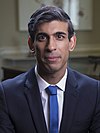The race to replace Boris is underway
The runners and riders in the 2022 Conservative leadership contest.
At the 2019 leadership contest, I did a write-up of the hustings event I attended in London as a member of the National Convention. Unfortunately, as I am no longer a local association officer or a member of the Essex Area executive, I am no longer a member of the National Convention, so won't get an invite! But I thought I'd do a 'Runner & Riders' blog for it anyway.
I shall not here dilate upon the reasons for this contest, which I have already written about here. We are where we are and the outcome of this election will, once again, determine not only the next Leader of the Conservative and Unionist Party but also the next Prime Minister of the United Kingdom. The stakes are, therefore, decidedly high.
The process has been outlined by the 1922 Committee (which is essentially the parliamentary group of the Conservative Party in the House of Commons and their main decision-making body). Nominations opened and closed yesterday (July 12th), with each candidate needing to have nominations from at least 20 Conservative M.P.s to reach the first ballot, which will be held this afternoon.
Under the new rules agreed by the '22, each candidate will need to win at least 30 votes in the first ballot in order to avoid dropping out and proceeding to the second round. In each subsequent round, the candidate with the fewest votes will be eliminated. This is what is known as an 'exhaustive ballot'. In the end, when only two candidates remain, there will be a balloting of the Conservative membership, on a 'one member, one vote basis'. The candidate who receives the most votes, wins. The Party is hoping to have this all done and dusted in time for the recess, so that there can be public hustings during the summer holiday. The new leader is expected to be announced by September 5th, in time for the return of Parliament and the Party Conference in October.
The Runners & Riders:


KEMI BADENOCH **ELIMINATED IN THE FOURTH BALLOT**
Kemi Badenoch, M.P. has been M.P. for Saffron Walden since 2017 and was formerly Minister of State for Local Government, Faith & Communities and Minister of State for Equalities under Boris Johnson until her resignation last week. I have generally found Mrs Badenoch highly impressive and I actually met her a few years ago at an event at C.C.H.Q., where she talked passionately about her politics and the hoops she had to jump through to become an M.P. Her backstory is that she was born in Wimbledon. Her late father was a G.P. and her mother is a professor and the family lived for a time in the U.S. and in Nigeria but she returned to the U.K. when she was 16 to live with a friend due to the political instability in Nigeria. She worked for a time in a McDonald's before completing a Masters in Computer Engineering at Sussex. She later obtained a law degree by studying part-time at Birkbeck. She joined the Conservative Party at 25 and worked in I.T. as a software engineer and as a systems analyst in the financial services sector. She was briefly a member of the London Assembly before being elected to Parliament. She supported Brexit, calling it "the greatest ever vote of confidence in the project of the United Kingdom". She is generally seen as being on the right of the Party, advocating "strong but limited government". Mrs Badenoch is among the less experienced of the candidates, having been first appointed to the frontbench in 2019, when Boris Johnson made her a Parliamentary Under-Secretary at the Department for Education. The following year, he promoted her to Exchequer Secretary to the Treasury with the additional role of Minister for Equalities. In the latter role, she made headlines in a Black History Month debate by outlining the Government's opposition to primary and secondary schools teaching 'white privilege' and similar "elements of critical race theory" as uncontested facts. She was promoted to the rank of Minister of State last year. She is running on a platform of 'limited government'. She is not a fan of the 'Net Zero' stuff. I find her very compelling.


SUELLA BRAVERMAN **ELIMINATED IN THE SECOND BALLOT**
The Rt. Hon. Suella Braverman, Q.C., M.P. has been M.P. for Fareham since 2015 and is currently H.M. Attorney-General. Mrs Braverman was born in Harrow to first generation Indian immigrants. She read law at Queen's College, Cambridge and was chair of the Cambridge University Conservative Association. She later studied at the Sorbonne on a scholarship. Called to the bar at the Middle Temple, she was a practicing barrister until her election to Parliament. She campaigned for Brexit and was chair of the E.R.G. until her promotion to the frontbench in 2017 (she was replaced by Jacob Rees-Mogg). She served under Theresa May as a Parliamentary Private Secretary to the Treasury until the 2018 reshuffle, when she was promoted to Parliamentary Under-Secretary at the Department for Exiting the European Union but in November that year she resigned alongside the Brexit Secretary, Dominic Raab, in protest at Mrs May's proposed deal. Very much a figure on the right of the Party, she was appointed Attorney-General by Boris Johnson in 2020. Since announcing her leadership bid, she has pledged to cut tax, cut government spending, tackle the cost of living, solve the Channel crossings problem, deliver on Brexit opportunities and "get rid of all of this woke rubbish".

JEREMY HUNT**ELIMINATED IN THE FIRST BALLOT**
The Rt. Hon. Jeremy Hunt, M.P. has been M.P. for South-West Surrey since 2005 and is currently Chairman of the Health and Social Care Select Committee. He was, of course, previously Foreign Secretary under Theresa May and is one of the more experienced candidates, being the only veteran of the 2019 leadership contest, when he came second to Boris Johnson. Mr. Hunt was also famously the longest-serving Health Secretary in our history under both David Cameron and Theresa May. His background is undeniably that of the English landed gentry. His father was the late Admiral Sir Nicholas Hunt and he has a number of illustrious ancestors. He was educated at Charterhouse and read P.P.E. at Magdalen College, Oxford, where he was a contemporary of both Messrs. Cameron and Johnson and active in the Oxford University Conservative Association. After university, he worked as a management consultant and became an English teacher in Japan, where he met his wife. On returning to Britain, he became an entrepreneur and a self-made millionaire. After his election to Parliament, he became an early supporter of his old university chum Mr. Cameron, who appointed him Shadow Culture Secretary - the brief he retained when the Coalition Government was formed in 2010. As Culture Secretary, he oversaw the successful 2012 Olympic Games in London. Later that year, he was appointed Health Secretary, a post in which he remained for six years (a record). During his tenure, Mr. Hunt pursued an ambitious agenda to address patient safety, regional variations in premature deaths, health tourism and A&E waiting times and oversaw increased spending on the NHS but attracted the ire of the usual vested interests, as Tory health secretaries always do. He campaigned for Britain to remain in the E.U., which is the principle reason I personally could not vote for him though I will say that, both when I met him years ago at a Tory dinner and again when I heard him speak at the hustings in 2019, he is very impressive and was easily the candidate who looked most like a Prime Minister. If I were not worried about the N.I. protocol and securing Brexit, I would probably be minded to vote for him. He replaced Boris as Foreign Secretary in Theresa May's government and stood against him for the leadership after Mrs May resigned. He subsequently returned to the backbenches and has served as Chairman of the Health Affairs Select Committee for the past two years.


PENNY MORDAUNT**ELIMINATED IN THE FIFTH BALLOT**
Capt. the Rt. Hon. Penny Mordaunt, F.R.S.A., R.N.R., M.P. has been M.P. for Portsmouth North since 2010 and is currently Minister of State for Trade Policy, as well as a serving officer in the Royal Navy Reserve. Miss Mordaunt - or Captain Mordaunt, as I feel she should rightly be called - was born and raised in Torquay as the daughter of a paratrooper and was reportedly named after a battleship (H.M.S. Penelope), which probably tells you all you need to know! She was educated at a Catholic comprehensive and, when her mother died of cancer when she was just 15, she became the primary caregiver to her siblings and worked as a magician's assistant to pay her way through sixth form. She later read philosophy at Reading, becoming the first member of her family to go to university, and was President of the Reading University Students' Union. Prior to her election, she worked in P.R., including for the Conservative Party under both John Major and William Hague. Following her election, David Cameron appointed her to his frontbench as a Parliamentary Under-Secretary at the Department for Communities & Local Government in 2014, before promoting her to Minister for the Armed Forces the following year - the first woman to hold the post. She campaigned for Brexit and, under Theresa May, served as a Minister of State at the Department for Work & Pensions before being promoted to the Cabinet as International Development Secretary in 2017. In 2019, she was promoted as the first ever female Defence Secretary. Following Mrs May's resignation, she initially returned to the backbenches but return to serve under Boris Johnson in 2020 initially in the sinecure role of Paymaster-General and latterly as Trade Minister. I am a bit of a fan of Captain Mordaunt, not least because of the delicious way she dealt with Angela Rayner in the Commons but it would be fair to say that she is firmly on the 'liberal wing' of the Party. She has, however, already got herself into bother with the tiresome question of whether trans-women are women. Personally, I find this 'identitarian' politics tedious and I hope it will not absorb too much of the campaign, particularly when there are such pressing matters that face the country.


The Rt. Hon. Rishi Sunak, M.P. has been M.P. for Richmond (Yorks.) since 2015 and was, until recently, Chancellor of the Exchequer. Mr. Sunak was born in Southampton to Indian immigrants, who prospered. He was educated at Winchester and read P.P.E. at Lincoln College, Oxford and later obtained an M.B.A. from Stanford as a Fulbright Scholar. It was at Stanford that he met his wife, Akshata, who as we all know is the daughter of an Indian billionaire. Mr. Sunak later worked for Goldman Sachs as a hedge fund manager before being elected to Parliament. Since then, he has risen rapidly through the ranks. He campaigned for Brexit and, following the 2017 General Election, Theresa May appointed him a Parliamentary Under-Secretary at the Ministry of Housing, Communities & Local Government. When Boris Johnson became P.M., he appointed Mr. Sunak to his Cabinet as Chief Secretary to the Treasury - an extremely rapid promotion. Just a few months later, he was suddenly promoted to Chancellor - one of the Great Offices of State - following the sudden resignation of Sajid Javid. Mr. Sunak ended up presiding over the Treasury during the Covid-19 pandemic, implementing unprecedented financial measures, including the furlough scheme. Perhaps most famously, his post-lockdown 'Eat Out To Help Out' scheme earned him the nickname 'Dishy Rishi'. Personally, I think he stepped up to the plate at a difficult time and showed considerable talent and ingenuity. I was not, however, a fan of his proposed tax rises and I suspect the F.P.N. he received as part of 'Partygate' and his perceived treachery to Boris by resigning and triggering a record-breaking series of mass resignations will play against him if and when his candidacy is put to the Party faithful but, for now, he is leading the pack. Having been widely seen as the dauphin under Boris for so long, his campaign hit the ground running early on and I suspect he will be in the final two.


The Rt. Hon. Elizabeth Truss, M.P. has been M.P. for South-West Norfolk since 2010 and she is currently the Foreign Secretary. She was born in Oxford as the daughter of a mathematics professor and grew up in Scotland and later Leeds. She attended a comprehensive school and read P.P.E. at Merton College, Oxford, where she was actually President of the Oxford University Liberal Democrats but joined the Tories shortly after she graduated. She worked as an accountant prior to being elected to Parliament and served one term as a Greenwich councillor. She joined the frontbench in 2012, when David Cameron appointed her a Parliamentary Under-Secretary at the Department for Education. She was later promoted to the Cabinet as Environment Secretary in 2014 and supported remaining in the E.U., though is now a strong proponent of Brexit (having been endorsed by arch-Brexiteer Jacob Rees-Mogg). Theresa May appointed her as the first female Lord Chancellor in the 1,000-year history of that office and, following the 2017 G.E., she was appointed Chief Secretary to the Treasury. It was probably around that time that I met her, actually. She came and did an afternoon campaigning with us in Laindon and I got paired up with her when we were out leafleting. She was very chatty and pleasantly down to earth. After Mrs May resigned in 2019, Miss Truss backed Boris for the leadership and he appointed her International Trade Secretary before promoting her to Foreign Secretary last year - only the second woman to hold the post. She has said she wants to cancel the planned rise in Corporation Tax and reverse the N.I. increase, funded by delaying the date by which the national debt is planned to fall, as part of a "long-term plan to bring down the size of the state and the tax burden". She stuck with Boris to the bitter end and is probably the closest to a 'continuity Johnson' candidate.


TOM TUGENDHAT**ELIMINATED IN THE THIRD BALLOT**
Lt.-Col. Tom Tugendhat, M.B.E., V.R., M.P. has been M.P. for Tonbridge & Malling since 2017 and is currently Chairman of the Foreign Affairs Select Committee. His background is undeniably plummy. He was born in Westminster and is the son of Sir Michael Tugendhat, a retired High Court judge. His uncle is Lord Tugendhat, a former Tory M.P. who later became Vice-President of the European Commission. His grandfather was an Austrian jew who came to Britain after World War I and later converted to Roman Catholicism. Colonel Tugendhat was educated at St. Paul's and studied theology at Bristol before doing a Masters in Islamic Studies at Gonville and Caius College, Cambridge, learning Arabic in the Yemen. He worked in journalism and P.R. in the Middle East before entering Parliament and also joined the Territorial Army part-time and saw active service in the Intelligence Corps in Iraq and Afghanistan, later working for the Foreign Office with the Afghan Government and serving as a military assistant to the then Chief of the Defence Staff, Gen. Sir David (now Lord) Richards. Following his election, Colonel Tugendhat has become a respected voice in the field of foreign affairs and defence matters and has chaired the Foreign Affairs Select Committee since 2017 (the youngest holder of the post). He supported Britain remaining in the E.U., which is clearly an area where he and I disagree, but there is no denying he is an impressive figure. He is a trenchant critic of Russia, China and Iran and a strong supporter of Israel and is generally regarded as a foreign policy 'hawk', though otherwise he is seen, politically, as part of the moderate 'One Nation' faction of the Party. He won a lot of plaudits for his speech following the fall of Kabul last year, describing it (rightly) as our "biggest foreign policy disaster since Suez", and was one of five M.P.s sanctioned by the Chinese Communist Government (a badge of honour). He is running on a platform of cancelling the N.I. increase and cutting fuel duty. His lack of ministerial experience will likely play against him.


NADHIM ZAHAWI **ELIMINATED IN THE FIRST BALLOT**
The Rt. Hon. Nadhim Zahawi, M.P. has been M.P. for Stratford-on-Avon since 2010 and is currently Chancellor of the Exchequer, having replaced Rishi Sunak last week. He is a first generation immigrant, being an Iraqi-born Kurd who came to Britain at the age of 11, when his family fled the Saddam Hussein regime. His father was a successful businessman and Mr. Zahawi was public school educated before studying engineering at U.C.L. Starting off as a chemical engineer, he went on to have a very successful business career himself, founding YouGov. He was also a Wandsworth councillor before being elected to Parliament. Following his election, Mr. Zahawi joined David Cameron's No. 10 Policy Unit. He campaigned for Brexit and joined the frontbench under Theresa May as a Parliamentary Under-Secretary at the Department for Education in 2018. The following year, Boris Johnson moved him to the Department for Business, Energy & Industrial Strategy and during the pandemic he was put in charge of the successful rollout of the Covid-19 vaccine. Last year, he became Education Secretary and was in that post until last week, when he replaced Mr. Sunak as Chancellor. Mr. Zahawi has pledged to increase defence spending, as well as "protecting [children] from damaging and inappropriate nonsense being forced on them by radical activists". He has announced he would cut Corporation Tax, Income Tax and N.I., funded by 20% cuts to every government department.







